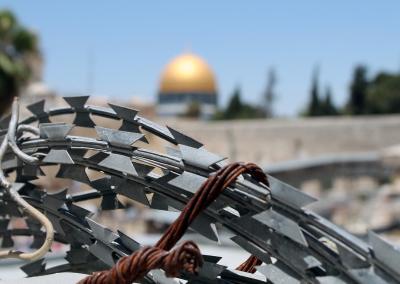
Israel's paramilitary plan advances

The Israeli cabinet on April 2 authorized plans for a paramilitary "National Guard" sought by far-right National Security Minister Itamar Ben-Gvir to target violence and unrest in Palestinian communities within Israel. Prime Minister Benjamin Netanyahu's office said that a committee comprised of Israel's existing security forces is to determine the guard's responsibilities, and whether it will be subordinate to the Israel Police or take orders directly from Ben-Gvir, as he demands. Opposition leader Yair Lapid responded by calling the plan an "extremist fantasy of delusional people," and slammed a decision to cut budgets from other ministries "to fund Ben-Gvir's private militia." (Al Jazeera)
The divisions within the security services over the plan are made clear by the controversy over a leaked phone call between Ben-Gvir and Police Commissioner Kobi Shabtai. After Ben-Gvir said the National Guard was needed to combat record-high crime rates in Arab communities, Shabtai responded: "Mr. Minister, there is nothing that can be done. They kill each other. That is their nature. That is the mentality of the Arabs." Ben-Gvir evidently leaked the audio in an effort to delegitimize Shabtai—which is certainly an irony given Ben-Gvir's own extremist views. (Times of Israel)
Escalation from Jerusalem to Lebanon
The controversy comes amid a new escalation in occupied East Jerusalem, which now threates to become internationalized.
Israeli police on April 5 raided al-Aqsa Mosque and arrested 350 people inside. Police said in a statement that they forced entry in a bid to remove "masked agitators" who had barricaded themselves in. However, worshippers inside the mosque claimed that they were violently attacked and that police prevented medics from reaching al-Aqsa after the clash. Videosreleased on social media appear to show police firing stun-grenades and beating worshippers during the raid. Some 400 were arrested, and the Palestinian Red Crescent said seven were injured. (Jurist, Haaretz)
After the violence at al-Aqsa, several rockets were fired from the northern Gaza Strip into Israel. The Israeli military said five rockets were intercepted by the aerial defense system around the city of Sderot, while four others fell into uninhabited areas. Israeli warplanes then struck multiple sites in Gaza City and the Strip's Nuseirat refugee camp. (Al Jazeera)
On April 6, after a second night of clashes at al-Aqsa, a barrage of 34 rockets was fired into northern Israel—this time from Lebanese territory, according to authorities. Five of the rockets landed within Israel, with one person reportedly injured by shrapnel. (CBS)
Israel this time responded with air-strikes on supposed Hamas targets both in Gaza and southern Lebanon. Houses were reportedly destroyed in strikes on a Palestinian refugee camp near the city of Tyre. These constituted Israel's biggest missile strikes on Lebanese territory since the 2006 war. (ToI, Naharnet, The Guardian)
Southern Lebanon is controlled by Hezbollah, which did not take responsibility for the rocket barrage, but has released a statement saying: "Hezbollah proclaims its full solidarity with the Palestinian people and the resistance groups, and pledges that it will stand with them in all measures they take to protect worshippers and al-Aqsa Mosque and to deter the enemy from continuing its attacks." (AFP)
Amid the violence, Israeli police have repeatedly detained far-right Jewish activists who planned to sacrifice goats at al-Haram al-Sharif—the compound that houses al-Aqsa Mosque and the Dome of the Rock. The sacrifices were to mark the Passover holiday, which comes this year at the same time Muslims celebrate Ramadan. (Al Jazeera, Haaretz, ToI)

